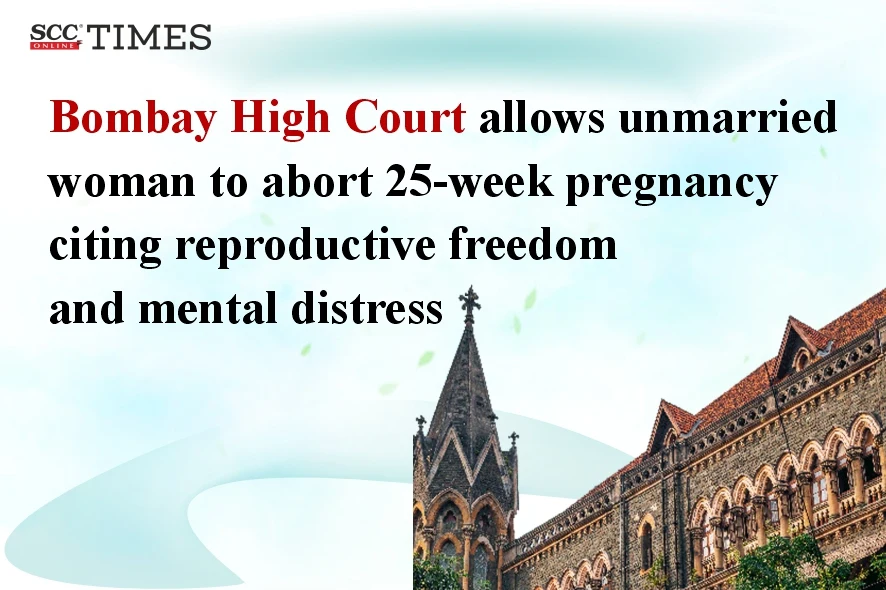Bombay High Court: The present petition was filed by the petitioner who sought permission for medical termination of her 25-week pregnancy under the Medical Termination of Pregnancy (‘MTP’) Act, 1971, citing grave injury to her mental health as it resulted from a failure of contraceptive measures. The Division Bench of Revati Mohite Dere and Dr. Neela Gokhale, JJ., recognising the right of the petitioner to reproductive freedom, autonomy over her body and right of choice, permitted abortion at 25-weeks noting that the continuance of the pregnancy shall adversely affect an already disturbed psychological condition of the petitioner.
Background:
The petitioner, a 31-year-old unmarried woman, was in her 25-week of pregnancy resulting from a consensual relationship. The pregnancy occurred due to the failure of a contraceptive device used by her and her partner to prevent conception. The relationship ended and, thus, she sought permission for medical termination of the pregnancy at a medical institution of her choice fearing social stigma and mental distress.
The petitioner filed a petition, wherein an order dated 13-6-2025 directed the constitution of a Medical Board (the ‘Board’) in terms of the MTP (Amendment) Act, 2021 read with the MTP Act. Thereafter, she was subjected to a medical examination under Rule 3A (b)(ii) of the MTP Rules and a medical report was sought. The report highlighted that while the petitioner was fit for termination of pregnancy, there were no medical grounds for the same in the petitioner at this gestational age of the foetus.
The Board acknowledged and empathised with the petitioner’s concern and considered the psychiatric and psychological opinion which did not diagnose any active psychiatric disorder, opined that, there was no substantial foetal anomaly or a grave certified risk to her physical or mental health.
The Board concluded that she was fit to undergo the procedure of MTP if the Court agreed that continuation of the pregnancy would cause grave anguish to the petitioner due to her personal or social circumstances, then the termination of pregnancy could be done in any tertiary care institute with the possibility of foetus being born alive who might have to bear the complication of its preterm birth.
The counsel for the petitioner submitted that the petitioner had no financial nor any emotional support to carry the said pregnancy to its full term. It was further stated that the continuance of pregnancy constituted a grave injury to the mental health of the petitioner caused by the anguish of her situation. The counsel also drew attention of the Court towards the medical history and background of the petitioner in as much as her parents were not inclined to support her and neither was her partner willing to offer any assistance.
The respondent’s counsel contended that neither there was any foetal anomaly, nor did the pregnancy occurr on account of non-consensual relationship. The respondents suggested that the Court might direct continuance of pregnancy to the full term after which the State would shoulder all the responsibility of the child, if born alive, including its rehabilitation by way of placing the child in adoption or otherwise.
Analysis and Decision to permit abortion at 25 weeks:
The Court while referring to the report observed that the petitioner had a history of illness and the continuance of the pregnancy occurred due to failure of the contraceptive device had caused her tremendous amount of anguish constituting grave injury to her mental health. It was further noted that her parents/family was not aware of the pregnancy and if they learn about her pregnancy, they will not accept the same, leaving her in a complete lurch to fend for herself.
The Court relied on A (Mother of X) v. State of Maharashtra, (2024) 6 SCC 327, wherein it was held that the Board’s report must reflect the effect of the pregnancy on the pregnant person’s physical and mental health, and, also primacy had to be accorded to the pregnant person’s consent. The Supreme Court therein had noted that the right to abortion was a concomitant right of dignity, autonomy and reproductive choice which was guaranteed under Article 21 of the Constitution.
Perusing the report of the Medical Board, the dictum laid down by the Supreme Court, the Bench’s interaction with the petitioner, the Court held that, continuance of the pregnancy would adversely affect the petitioner’s mental health and, thereby, permitted the petitioner to medically terminate the pregnancy.
[ABC v. State of Maharashtra, 2025 SCC OnLine Bom 2556, decided on 19-6-2025]
Advocates who appeared in this case:
For the Petitioner: Nikita Raje
For the Respondent-State: M. P. Thakur, AGP


